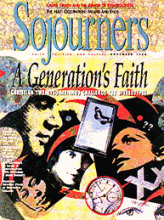T Bone Burnett is a musicians musician. Quite accomplished in his own right as a singer and guitarist, his most recent release, The Criminal Under My Own Hat (Columbia, 1992), is one of the most musically fulfilling and lyrically uncompromising offerings in the last decade.
Still, he seems to prefer making others shine at their brightest. In that regard, he is the producer of many recent hit recordingsthe Counting Crows August and Everything After; Nothing But a Burning Light, by Bruce Cockburn; and Elvis Costellos Spike; as well as Sam Phillips new Martinis and Bikinis.
I was invited last summer by Burnett to attend a concert headlined by Phillips, his wife. After the show, Sam ex-plained to me that T Bone hadnt had a good day and so was relaxing in the Green Room, away from the backstage crowd. She encouraged me to visit him anyway, just to make the personal connection.
After a few moments of discussing the news of the weekinvasion talk of Haiti and the likewe decided to meet at his hotel room. There, energized by a healthy dose of political conversation and a pot of caffeinated coffee, T Bone began searching the room for a Gideon Bible. Finally he found it stashed in one of the many drawers of a large dresser. Once he had it in hand, he headed straight for the gospels, knowing full well what he was looking forJesus, especially as he dealt with the Pharisees.
That is where T Bones heart is right now; he wants to unmask the Pharisees. And to equip himself, he went in search of Jesus methods. Every few verses he would recite with glee the way in which Jesus addressed the Phariseesdirectly but not in ways that would make him open to the Pharisees traps. No, T Bone reflected, Jesus broke through to a new level using his imagination and ability to cut to the heart.
Read the Full Article
